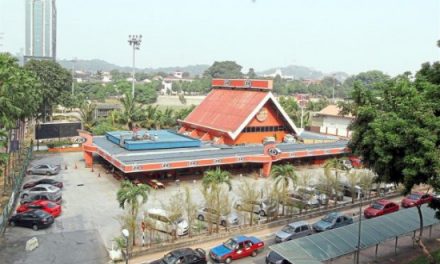Study shows financial stress up 35% in Malaysia since Covid-19 hit
The financial stress faced by Malaysians since the pandemic began in the country last year has gone up some 35%, according to a recent study by the Credit Counselling and Debt Management Agency (AKPK). The study titled “Money and Mental Well-Being” conducted last year found more than 65% out of 3,115 Malaysians interviewed felt that financial stress has affected their job performance. And 41% admitted that financial stress has taken a toll on their mental health. According to the news report, Malaysia’s high cost of living is the most common factor leading to financial stress, followed by low income and low savings. The study found that workers aged between 30 and 39 years-old have the highest financial stress scores compared to their peers from other age groups, while young workers aged 29 and below were more stressed by low salaries and overspending. Government employees seemed to have better mental health compared to their private sector peers, while men were found to experience higher financial stress compared to women. (Malay Mail)
‘Phase One states being studied’
The government is considering easing restrictions for fully vaccinated individuals living in states under Phase One of the National Recovery Plan (NRP), says Datuk Seri Hishammuddin Hussein. He said the government was still getting input and feedback from experts. “We are also looking even for Kuala Lumpur, Selangor and Negri Sembilan that are currently in Phase One,” he said. Hishammuddin said the move to ease restrictions was being considered for the sake of mental health in non-high-risk areas. On Sunday, the government announced several privileges for those fully vaccinated and living in states categorised as Phase Two and subsequent phases under the NRP. The measures include allowing dine-in at restaurants, outdoor individual sports and tourism. “The government surely will consider all the responses from all stakeholders in the health, economic and social sectors,” he said, adding that there was also public concern over new Covid-19 variants, especially Delta. (The Star)
Unvaccinated form bulk of Malaysia’s new Covid-19 cases
Most of Malaysia’s Covid-19 infections, especially serious cases that require intensive care unit (ICU) treatment, are now coming from the unvaccinated. Analysis of Health Ministry figures show that 8 of out of 10 people who were infected over the past two weeks have not gotten a vaccine jab. There was also no information on how many among the unvaccinated who got infected had already registered for vaccination, or how many of them were not yet eligible for vaccination, such as those below the age of 18. Currently, under-18s are allowed to register for their jabs, although the vaccination rollout for this group is still being reviewed for its benefits and risks. Data shows that vaccines give effective protection from severe disease in the event of a breakthrough infection, which is when someone gets Covid-19 after being fully vaccinated. Of the 2,881 Covid-19 patients listed as Categories 4 and 5 in the past two weeks, 2,584 or 89.7% were those with no vaccination history. (The Star)
Zuraida: SPNB to take over management of PPR houses
Management of the newly completed People’s Housing Projects (PPR), and those scheduled for completion this year will be taken over by Syarikat Perumahan Negara Berhad (SPNB), said Housing and Local Government Minister Datuk Zuraida Kamaruddin. The move, she said, was to speed up and facilitate the ownership management process for eligible applicants so that they could occupy the units within six months after applying. She said the policy was also to improve the ownership management process which was previously handled by the relevant agencies under the state government. “SPNB will also play a role in maintaining the PPR projects, so that we can prevent these houses (PPR) from being misused by buyers or tenants,” she said. She said so far, construction of 11 new PPRs have been completed, involving more than 40,000 units, with four of them in Pahang, Kelantan (three), Langkawi (two) and Johor (two). (Malay Mail)
Delayed recovery expected for secondary market
The residential property market, which was already muted prior to the Covid-19 outbreak early last year, has remained in the doldrums throughout the pandemic. “The secondary market was affected by the recent Full Movement Control Order (FMCO) as physical property viewing, which is preferred for subsale homes, was made logistically complicated for buyers. Despite the emerging trend of virtual viewings/tours and the rising number of online sales, physical property viewing is still a must for most subsale buyers as it allows potential buyers to see the upkeep, interior conditions and renovations made to the property on offer,” says Knight Frank Malaysia deputy managing director Keith Ooi. Meanwhile, Henry Butcher Real Estate Sdn Bhd COO Tang Chee Meng notes that owners are still hanging on to their asking prices, which buyers are not prepared to match. He adds that the ongoing Home Ownership Campaign (HOC) and the incentives given will draw buyers’ interest away from the secondary market. Industry experts believe the Covid-19 vaccine is the silver bullet for market recovery, and expect to see a recovery only in 2022. (The Edge)
Maybank IB wins Malaysia’s Best Investment Bank for the sixth time
Maybank Investment Bank Bhd (Maybank IB) was named Malaysia’s Best Investment Bank at the prestigious Euromoney Awards for Excellence 2021 for the sixth time, on the back of multiple landmark transactions amidst a challenging market environment. Euromoney, an English-language monthly magazine focused on business and finance, highlighted Maybank IB’s leading role in MISC Bhd and KLCC Stapled Group’s US$750.4 million concurrent secondary placement. In the debt market, it said Maybank IB’s key deals included a sustainability sukuk musharakah for Sime Darby Property Bhd. Chief executive officer Fad’l Mohamed said Maybank IB was honoured with the recognition and attributed the win to its staff and clients. “We couldn’t have done it without our dedicated teams who adapted quickly and our clients’ trust in us to deliver during these unprecedented times,” he added. (The Edge)





